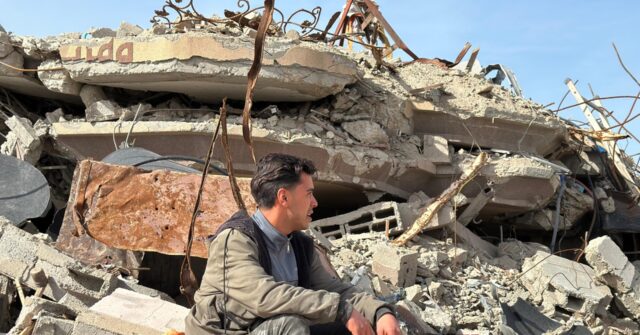After meeting with Saudi Crown Prince Mohammed bin Salman (MBS) at an emergency summit in Doha, Qatar, on Monday, Iranian President Masoud Pezeshkian declared that Iran, Saudi Arabia, and other major Muslim powers have a “very heavy responsibility” to prevent Israeli “aggression” – such as the airstrike that killed terrorist leaders living in luxury in Doha last week.
The summit in Qatar’s capital on Monday was a joint session of the Arab League and the Organization of Islamic Cooperation, which mustered about 60 representatives between them. The meeting was called in response to the Israeli strike targeting senior Hamas leaders who have been sheltered by the Qataris since Hamas raped, kidnapped, and murdered hundreds of Israeli civilians on October 7, 2023.
Pezeshkian said that if Islamic nations stand “united,” Israel will “not dare to attack or invade any Muslim countries.”
The Iranian president said Saudi Arabia could play “an important role in the path of unity of Islamic countries,” given its status as steward of Islam’s holiest sites, along with its wealth and influence.
Pezeshkian also urged “unity and cohesion among Islamic countries” when he met with Egyptian President Abdel Fattah el-Sisi, and urged Pakistani Prime Minister Shehbaz Sharif to confront “the savage crimes” of Israel through “unity of Islamic countries, adopting a unified stance, and taking practical action.”
Pezeshkian appeared to be far less influential at the meeting than Iranian state media portrayed him. Many of the attendees expressed anger at Israel’s airstrike, but few responded to Iran’s language of immediate and possibly violent confrontation.
Qatar was, unsurprisingly, at the head of the pack in criticizing Israel’s strike, but Emir Sheikh Tamim bin Hamad al-Thani mostly complained about how unfair and reckless it was.
Al-Thani accused Israel of launching a “treacherous attack targeting a residence housing the families of Hamas leaders and their negotiation delegation” in a bid to “thwart the negotiations.”
“If you wish to insist on the liberation of hostages, why then do they assassinate all negotiators? How can we host in our country negotiating delegations from Israel while they send drones and planes for an air raid against our country?” he asked.
“The negotiations between Israel and Hamas were about to reach an achievement with the help of the sisterly country of Egypt and the United States of America. This has resulted in the liberation of many hostages. Israel continues its intransigence and insistence on continuing the war,” he said.
Crown Prince Mohammed bin Salman, the de facto chief executive of Saudi Arabia, did some networking on the sidelines of the summit and expressed his support for Qatar in “confronting the brutal aggression against it.”
MBS was appreciative of the “unity” on display at the summit, but displayed little appetite for the fiery confrontation with Israel envisioned by Pezeshkian.
A common thread among the condemnations of Israel was that it went too far with its war against Hamas in Gaza, and crossed another line by launching a strike in Qatar. No one seemed interested in criticizing Qatar for sheltering the leaders of a savagely violent terrorist organization. Several of the summiteers followed al-Thani’s lead in alluding to reported U.S. displeasure with Israel’s action in Doha.
“We expect our strategic partners in the US to use their influence on Israel for it to stop this behavior – we really do expect that,” said Jasem Mohamed Albudaiwi, secretary-general of the Gulf Cooperation Council (GCC).
The Times of Israel (TOI) noted that the summit took place on the fifth anniversary of the launch of the Abraham Accords, the very process of peace and reconciliation between Arab states and Israel that Hamas hoped to destroy with the October 7 atrocities.
“The leaders of the UAE, Bahrain and Morocco, which signed the Abraham Accords recognizing Israel five years ago to the day, did not attend Monday’s talks, sending senior representatives instead,” TOI observed.
The joint communique issued by the summit was firm in denouncing the Israeli strike on Doha, but not as incendiary as Iran might have liked. Instead, it called for Arab League and OIC states to take “legal and effective measures to prevent Israel from continuing its actions against the Palestinian people.”
Arab League Assistant Secretary-General Hossam Zaki said the communique urged member states to “review diplomatic and economic relations” with Israel, but the request was “not a mandatory or binding paragraph.”
The Jerusalem Post said the surprising big winner from the Doha summit could be Syrian President Ahmed al-Sharaa, who made shrewd use of his time in Qatar by meeting with regional leaders on the sidelines and laying the groundwork for his trip to America for the United Nations General Assembly.
“A chance to meet with Arab and Muslim leaders provides the Syrian president with an opportunity to showcase his country and its needs to friendly nations. It also gives him backing in his own problems with Israel,” the Jerusalem Post noted.
Read the full article here


